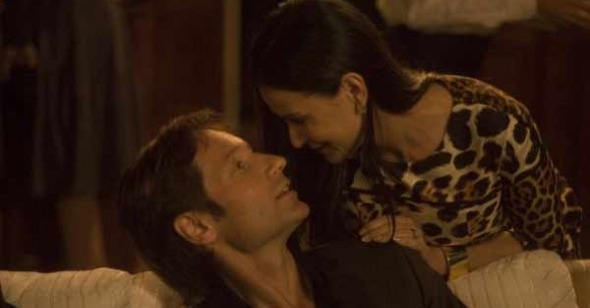Gross National Product
By Benjamin Mercer
The Joneses
Dir. Derrick Borte, U.S., Roadside Attractions
Asks The Joneses: What if advertisements infiltrated every level of American daily life, including your neighborly exchanges? A middling satire that eventually sinks into unbearable melodrama, first-time writer-director Derrick Borte’s send-up of American consumer culture is expectedly bland—this is the kind of film that implicitly invokes the American dream—but at least the luxury items being peddled and the methods of sale seem relatively current. It’s almost as if Borte had optioned for this film a wire story on the controversial 2007 Facebook feature that informed your friends of your internet purchases, staging that unsettling infringement on privacy by ruthless commerce in a generic gated community’s crown jewel, an immaculate model home pawned off as a real residence.
The Joneses—Steve (David Duchovny), Kate (Demi Moore), Jenn (Amber Heard), and Mick (Ben Hollingsworth)—are not actually a family, but they play one in order to sell items on behalf of a company with a roster of high-end clients. Steve, new to this role-playing racket, markets things like Under Armour, golf clubs, and Audi roadsters. Kate, the “head of household,” pushes clothing, accessories, and gourmet foods (flash-frozen sushi!). If in our culture there is such a thing as retail politics, then I suppose the trade plied by the Joneses might be called retail retail, carried out on the sly.
Jenn and Mick’s activities aren’t quite as clear. They’re shown sauntering through the halls and locker rooms of their high school, attaining instant popularity and presumably also racking up sales, though their personal crises—Ben feels pressured by his line of work to remain closeted, and Jenn must lead a double life to accommodate her prolific sleeping around—get more airtime than their wheeling and dealing. It remains unclear how these two enroll in school under aliases, or how old they actually are. The film is just hyperreal enough to avoid getting instantly bogged down by such logistical questions, including the very legality of the whole Jones charade—falsified documents must be necessary to maintain appearances, but the film’s later what-we’re-doing-is-wrong revelations are strictly matters of personal conscience. Ultimately, the half-thought-through quality of the scenario takes much of the sting out of the satire.
There is still a little sting in there, though. The Joneses are first seen in their SUV, running down the cold demographic facts of the community in which they’re about to settle. The words “cell” and “unit” are used at various points by the Joneses to describe the true nature of their cohabitation, and from the very beginning there is something of the terrorist sleeper cell about them, though of course their aim is to exploit the distorted values of their neighbors for their financial gain, not to undermine those values entirely. It’s a surprisingly potent parallel, though, for such a generally weak-tea film. The Joneses work to embed themselves in their community, maintaining an outward appearance that belies their actual agenda. A shadowy company higher-up, KC (Lauren Hutton), also appears periodically to instruct them on how to proceed. She drives up in a black Town Car to report sales figures, and, when the unit starts to thrive, float the possibility of them achieving “icon status,” a rarefied designation given only to the most successful units. The very neighborly neighbors, mostly represented by the semi-hapless Larry (Gary Cole) and his cosmetics saleswoman wife, Summer (Glenne Headly), never suspect a thing.
Then, as they say, the bubble bursts. As the master Jones family drama takes shape—Steve’s boredom-induced courting of Kate becomes more serious, and she finally begins to let down her guard, unconvincing developments that are supposed to constitute the heart of the film—Larry and Summer find that the lifestyle that their next-door neighbors have sold them has put them deep into debt. This all comes to light in one (unintentional) howler of a scene in which Larry enters a room where Summer, bills splayed out all around her, is desperately crunching numbers on the computer. They have a tiff over the situation: she reproaches her husband for having missed a payment on the house and storms out of the room. Then on the computer screen there appears a pop-up ad for some gadget offering no payments for six months. Larry crosses the room to look more closely; he’s literally sucked in, a moth to the ad’s flame. It’s not long before the hopeless sucker straps himself to his fancy new lawnmower and drives straight into the pool, prompting Steve to give an emotional confession about who he really is. If that’s not sufficient in communicating the perils of materialism, Borte offers a garnish of brush-with-death. The suicide and the subsequent hand-wringing are preceded in the film by a drunk-driving accident after a party to which Mick brings one of his hottest new products: rum punch packaged in Capri Sun-like pouches.
The Joneses is never particularly funny, though it coasts for a while on the canny casting of Duchovny and Moore, whose pairing evokes a time in the ’90s when this kind of consumer-culture satire didn’t seem quite so passé, before they both became better known to the public for their personal lives than any of their on-screen roles. And Borte deserves some credit here for bringing his critique out of the supermarket, where independent American films as diverse as The Hurt Locker and Wendy and Lucy have sought in stand-alone scenes to articulate the Flaws of American Capitalism through a lazy shorthand of anesthetizing muzak and shots of endlessly receding aisles, intimidating in their height and depth. But in a desperate bid to hold audience attention, Borte turns away from these concerns and toward ludicrous melodramatics. Buyer beware.
